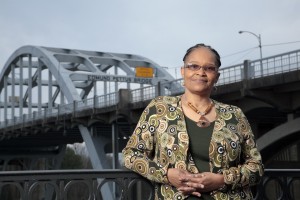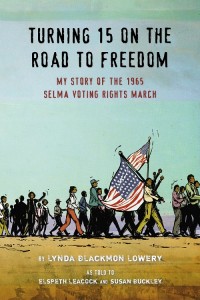2018 School Spending Survey Report
Civil Rights Protester and Memoirist Talks to SLJ
SLJ caught up with Lynda Blackmon Lowery, whose recent book Turning 15 on the Road to Freedom: My Story of the Selma Voting Rights March details her experiences participating in the civil rights movement as a teenager.

Photo by Robin Cooper
As a young teenager living in Selma, AL, Lynda Blackmon Lowery heard Martin Luther King Jr. speak one day and knew right away that she had to be a part of the struggle for civil rights. Despite her young age, she took part in protests, braving Bloody Sunday and the voting rights march from Selma to Montgomery: experiences that she details in her recent memoir, Turning 15 on the Road to Freedom: My Story of the Selma Voting Rights March (Penguin/Random, 2015). In anticipation of February's Black History Month, Lowery caught up with SLJ, describing her path to publication and the moments that made it all worth it. How did you come to publish your story? Two very good friends of mine, Elspeth Leacock and Susan Buckley, wrote a children’s book called Kids Make History: A New Look at America’s Story (HMH, 2006), and they were looking for a person who took part in the voting rights movement. They found me through the National Voting Rights Museum in Selma, where my sister was working, and I became a story in one of their books. We put together a presentation for schools called “History Can’t Happen Without You.” One day, they said, “You know, Lynda, we need to do a story just about you.” So we did 35 hours of taped interviews and 20 hours of face-to-face interviews, of me telling my story. It is still amazing to me that it has taken off and people are interested in it. In your book, you say that it was listening to Martin Luther King Jr. speak that inspired you to join the movement. What were you thinking and feeling that day? Well, to tell you the whole story, we used to watch a television program on Saturdays called Sergeant Preston of the Yukon. Sergeant Preston had this German shepherd called King. And all of us were in love with King. My grandmother was downtown one Saturday, and a friend of hers asked if she was going to see King that evening at Tabernacle Baptist Church, and she said, yes, she was. So we children all thought we were going to see this dog. A lot of people spoke that evening, and when they introduced Reverend Dr. Martin Luther King Jr., [at first] we were disappointed kids to say the least. But we sat and listened to what he was saying. Dr. King was talking about how it was essential that our parents get the right to vote and how we had to go about it nonviolently, by using steady, loving confrontation. When he started speaking that day, everybody got a little quiet, and you couldn’t hear anything but his voice. And it just sounded like it was booming. I didn’t understand all of it, but I knew it was something that I wanted to do. And I knew it was something that we could help do for our parents. You were so young. Was it difficult for your family to let you protest? My father thought it was too dangerous, but my grandmother thought there was safety in numbers. That’s why we went. The grown people told us all the time, no matter what, that they were going to take care of us, and they did. You talk a lot about the importance of music in the book, and you even include two songs: “Woke Up This Morning” and “Ain’t Gonna Let Nobody Turn Me Round.” Music is a way to get you up and moving and out, get your spirit jumping and get you involved, so yes, I included two of my favorite songs, at the beginning and end of the book. A lot of times, we would be in jail, lights out, dark, couldn’t sleep, scared, wondering what they were going to do to us. We would be sitting there, and then somebody would start singing, “Ain’t gonna let nobody turn me around.” So that kept your spirits happy and kept you going. Once we started singing, it gave us a little more strength, made you stick your chest out a little prouder. And you knew that you weren’t alone, because you weren’t singing that song all by yourself. You weren’t going to jail all by yourself or being shot at all by yourself. Music did play a big part in the entire movement. What was your most rewarding experience? It was the second day of the march from Selma to Montgomery, AL, when I turned 15. I got so scared that the three national guardsmen out there were going to hurt me. And [fellow protestor] Jim [Letherer] told me that he would protect me, that he would die for me before he let anyone else harm another hair on my head. I had to face…my fear of dying. My grandmother would tell us to always take fear and embrace it. Respect it, but don’t let it control you. That was a defining moment for me. That day, I took my fear and let it know that I did respect it but it wasn’t going to rule me. How has it been watching the landscape of Selma change over the years? It’s been bittersweet. In some ways, it’s been [rewarding]. In other ways, it’s been disheartening. [Rewarding], because we were finally able to vote out the mayor who had been in office 36 years, Joe Smitherman, and to elect our first black mayor, James Perkins Jr. The down side is when people don’t get out to vote at our elections, like the local and state elections or going to vote for congressmen. They don’t realize when you want to elect a president, you have to elect people who will help that president pass his agenda. That’s all over the United States, that people don’t get out and vote. They don’t realize that people fought for those rights, died for those rights, bled, cried. In light of recent protests in New York and in Ferguson, MO, what advice would you give to young people who want to make a difference? I’d like to tell children that they have the ability to change things. All they need is steady, loving confrontation. If you see something you don’t like, then work to change it.
You were so young. Was it difficult for your family to let you protest? My father thought it was too dangerous, but my grandmother thought there was safety in numbers. That’s why we went. The grown people told us all the time, no matter what, that they were going to take care of us, and they did. You talk a lot about the importance of music in the book, and you even include two songs: “Woke Up This Morning” and “Ain’t Gonna Let Nobody Turn Me Round.” Music is a way to get you up and moving and out, get your spirit jumping and get you involved, so yes, I included two of my favorite songs, at the beginning and end of the book. A lot of times, we would be in jail, lights out, dark, couldn’t sleep, scared, wondering what they were going to do to us. We would be sitting there, and then somebody would start singing, “Ain’t gonna let nobody turn me around.” So that kept your spirits happy and kept you going. Once we started singing, it gave us a little more strength, made you stick your chest out a little prouder. And you knew that you weren’t alone, because you weren’t singing that song all by yourself. You weren’t going to jail all by yourself or being shot at all by yourself. Music did play a big part in the entire movement. What was your most rewarding experience? It was the second day of the march from Selma to Montgomery, AL, when I turned 15. I got so scared that the three national guardsmen out there were going to hurt me. And [fellow protestor] Jim [Letherer] told me that he would protect me, that he would die for me before he let anyone else harm another hair on my head. I had to face…my fear of dying. My grandmother would tell us to always take fear and embrace it. Respect it, but don’t let it control you. That was a defining moment for me. That day, I took my fear and let it know that I did respect it but it wasn’t going to rule me. How has it been watching the landscape of Selma change over the years? It’s been bittersweet. In some ways, it’s been [rewarding]. In other ways, it’s been disheartening. [Rewarding], because we were finally able to vote out the mayor who had been in office 36 years, Joe Smitherman, and to elect our first black mayor, James Perkins Jr. The down side is when people don’t get out to vote at our elections, like the local and state elections or going to vote for congressmen. They don’t realize when you want to elect a president, you have to elect people who will help that president pass his agenda. That’s all over the United States, that people don’t get out and vote. They don’t realize that people fought for those rights, died for those rights, bled, cried. In light of recent protests in New York and in Ferguson, MO, what advice would you give to young people who want to make a difference? I’d like to tell children that they have the ability to change things. All they need is steady, loving confrontation. If you see something you don’t like, then work to change it. RELATED
RECOMMENDED
CAREERS
The job outlook in 2030: Librarians will be in demand
CAREERS
The job outlook in 2030: Librarians will be in demand
ALREADY A SUBSCRIBER? LOG IN
We are currently offering this content for free. Sign up now to activate your personal profile, where you can save articles for future viewing






Add Comment :-
Be the first reader to comment.
Comment Policy:
Comment should not be empty !!!